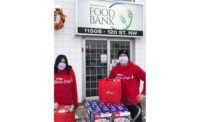Kellogg adds NaviLens technology on packaging for blind consumers in U.S.
Brands with the special packaging include Corn Flakes, Special K Original, Rice Krispies, Crispix.

Kellogg Company is changing the way the almost 12 million adults in the U.S. who are blind or have low vision perform daily tasks, such as navigating a grocery store aisle or choosing one's cereal at breakfast. To help create a place at the table, Kellogg is incorporating innovative NaviLens technology into the packaging of four of its cereal brands: Kellogg's Corn Flakes, Special K Original, Rice Krispies, and Crispix.
The front and side of these cereal boxes will now feature a NaviLens optical smart code comprising high-contrast colorful squares on a black background that can be detected and read by the NaviLens and NaviLens GO apps. With the apps, consumers can locate the boxes from several feet away, navigate to them, and hear their names, package sizes, and nutritional information. The apps can communicate this information in up to 36 languages.
"The heart of Kellogg's Better Days Promise ESG strategy is the advancement of sustainable and equitable access to food. We work hard to think outside the box to ensure our products are accessible to as many people as possible," said Charisse Hughes, chief brand and advanced analytics officer at the Kellogg Company. "Thanks to the hard work of our cross-functional teams, we're able to adapt and leverage this technology to ensure we're living by our purpose—to create a place at the table for everyone."
A commitment beyond packaging
In addition to the cereal packaging, Kellogg has committed to incorporating NaviLens codes in all corporate facilities in the U.S. by the end of 2023, to make them more accessible and easier to navigate for blind and low-vision employees. The company has already installed codes in its global corporate headquarters in Battle Creek, MI.
This initiative was brought to life through a partnership between Kellogg's Ready-To-Eat-Cereal business unit and Kapable, the company's business employee resource group that ensures Kellogg is a welcoming and inclusive environment for current and future employees with disabilities and their supporters.
Learn more about the people behind the development of this program in the U.S. here.
Bethany Foor, a member of Kellogg's Corporate Affairs team and a co-chair of Kapable, was instrumental in the development of the program. Foor has Usher syndrome—the leading cause of deaf-blindness.
"Despite my progressive loss in vision and hearing, I have managed to build a rich, fulfilling career at Kellogg. The company lives its mission, is committed to equity, diversity, and inclusion," Foor said. "I'm honored to be able to play a part in making some of Kellogg's most iconic products more accessible, and grateful for my colleagues and our leaders who are helping us create better days for the blind and those with vision loss."
Looking for a reprint of this article?
From high-res PDFs to custom plaques, order your copy today!







